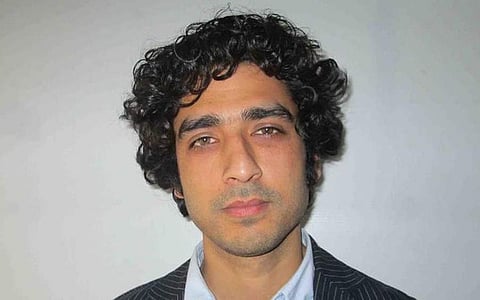
- LIFESTYLE
- FASHION
- FOOD
- ENTERTAINMENT
- EVENTS
- CULTURE
- VIDEOS
- WEB STORIES
- GALLERIES
- GADGETS
- CAR & BIKE
- SOCIETY
- TRAVEL
- NORTH EAST
- INDULGE CONNECT

Feroz Rather’s debut novel is the literary version of what Kashmir has come to denote — a beautiful landscape ravaged by violence. Written in the form of interconnected stories, Feroz Rather’s debut novel, The Night of Broken Glass succeeds in providing a literary landscape that is as beautiful as it is terrifying. In an email interaction, the US-based author spoke about aesthetic representations of violence, experimenting with the short story format, which has become a favoured narrative technique particularly amongst South Asian-origin writers, and more. Excerpts from the interview:
Tell us about the book. How did the idea for it come about and how long was it in the making?
The Night of Broken Glass is a collection of short stories, with a strong semblance of the novel, set in Kashmir. The image came to me one solitary moonlit winter night in the Central Valley of California while I was contemplating a dark flower visible in my window. All the shards—I mean all the stories—in The Night of Broken Glass, were written in Tallahassee from the summer of 2015 to the fall of 2017.
A lot of writers from South Asia are experimenting with and also trying to reinvent the short story format. What drew you to the short story route for your debut literary venture?
I believe that a long, sustained narrative like the novel derives its energies from societies that are layered and cosmopolitan. Think about the greatest novels of the nineteenth century like (Gustave Flaubert’s) Sentimental Education. The narrative reflects the society in which, as a result of the Industrial Revolution, a certain vibrancy was simultaneously felt in different realms of life: politics and economics, culture and arts. The desire to capture such a scenario is comprehensive and the vastness of the novel was born out of such ambition to render all these realms of activity within one single narrative.
Kashmir is an agrarian society. It never has had an industrial revolution. The decision to write a novel with little shards of stories I think is less my own and has to do more with the moral capacity of the society I come from. A society where instead of luxuriating in the bourgeoisie anxieties one could afford only in a cosmopolis, one has to deal with memory and the tyranny of the present. Where one has to measure the magnitude of pain inflicted on us by the despots.
My reality is South Asian but my influences necessarily are not. I wrote the first story, The Old Man in the Cottage, soon after reading Joseph Conrad’s wonderful short story The Lagoon. And the reason I like Conrad so much is because my society gives itself to be written into his sort of fiction.
What were the challenges you encountered in the process of the aesthetic representation of violence, which makes itself felt throughout your stories?
Once one has committed oneself to the act of writing, there is no stopping or going back. But I guess the challenge is to transform what is banal and potentially gratuitous into the language that is elevated and luminous. One wants one’s shards to gleam despite the darkness. We are brutalised and humiliated on a daily basis. The challenge is to confront our reality with dignity on the page and forge the acts of violence into scenes of terrifying beauty.
While fiction allows for a free reign of imagination for a writer, do you also feel that it allows for a sort of comfortable distance for the reader from the conflict ridden landscape that you have attempted to portray?
Yes, it does. It creates spaces where readers can linger while at a near distance—within the world of the story that registers somewhere else in readers’ mind—something grave is happening. In fact, all good fiction works like this, through suggestion and allusion while the action is delayed.
The beauty of the spaces you describe feels almost tangible throughout the narratives. How was the process of bringing that out through words that it almost ends up creating a sublime effect, a sort of beauty that comes with a feeling of terror?
Landscape and its great writers are important to me. I come from a village in Kashmir but I am drawn to the great cities of the world. But of all the cities it is Srinagar that I love the most. It is a deep-souled city where I can feel the magnanimity of the mystics. In ways I feel very sacred towards Srinagar and its shrines and you can witness the enthusiasm with which I have portrayed the city in the second story, The Pheran. The landscape also becomes important as a sight where one can exhume history.
Were there any authors you looked to for inspiration or some that might have influenced your own writing style?
I lean towards the stylists. Two writers whose politics I despise and whose prose I love are Naipaul and Nabokov. Naipaul is probably the most important writer for me. He is the most prodigious child of Conrad. He renders his hearts of darkness with an almost Flaubertian suppleness and felicity.
What are you working on next?
I am working on a novel set in California and Kashmir.
Harper Collins, INR399.